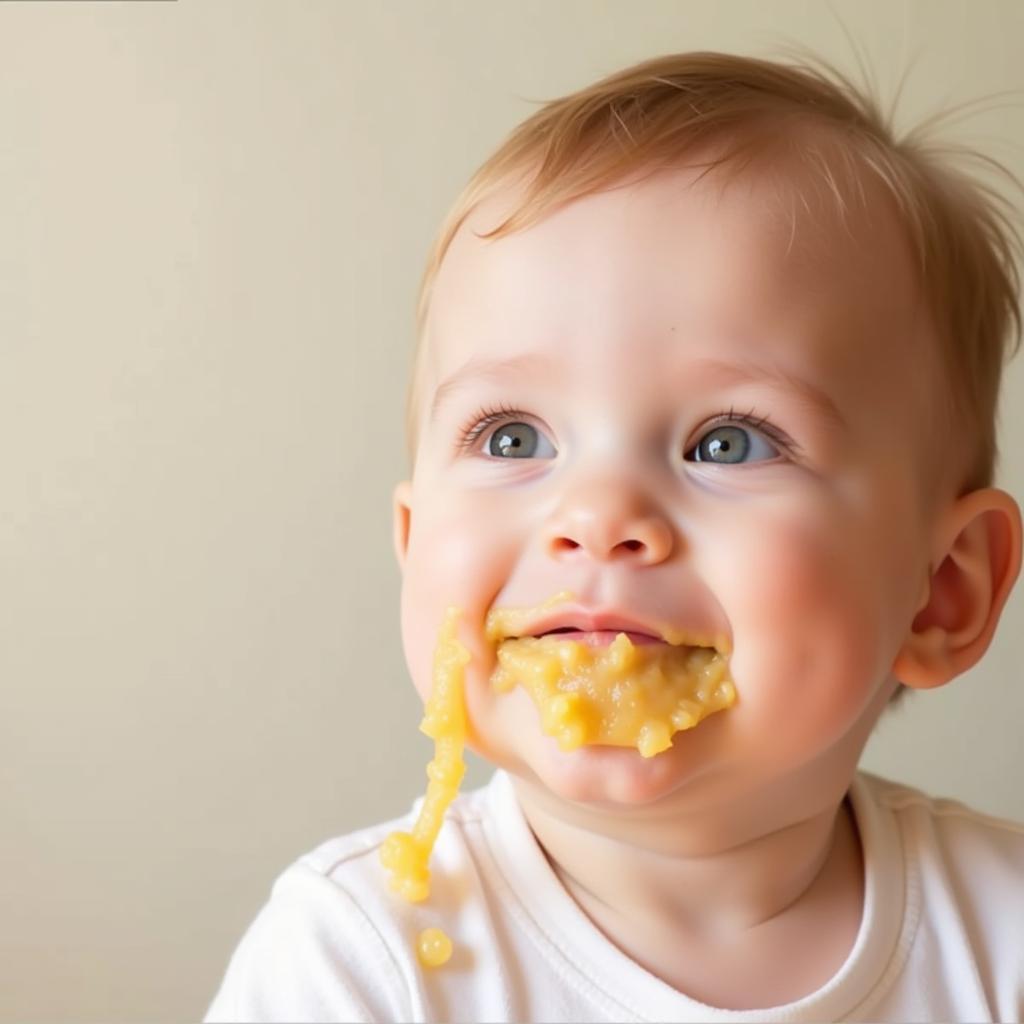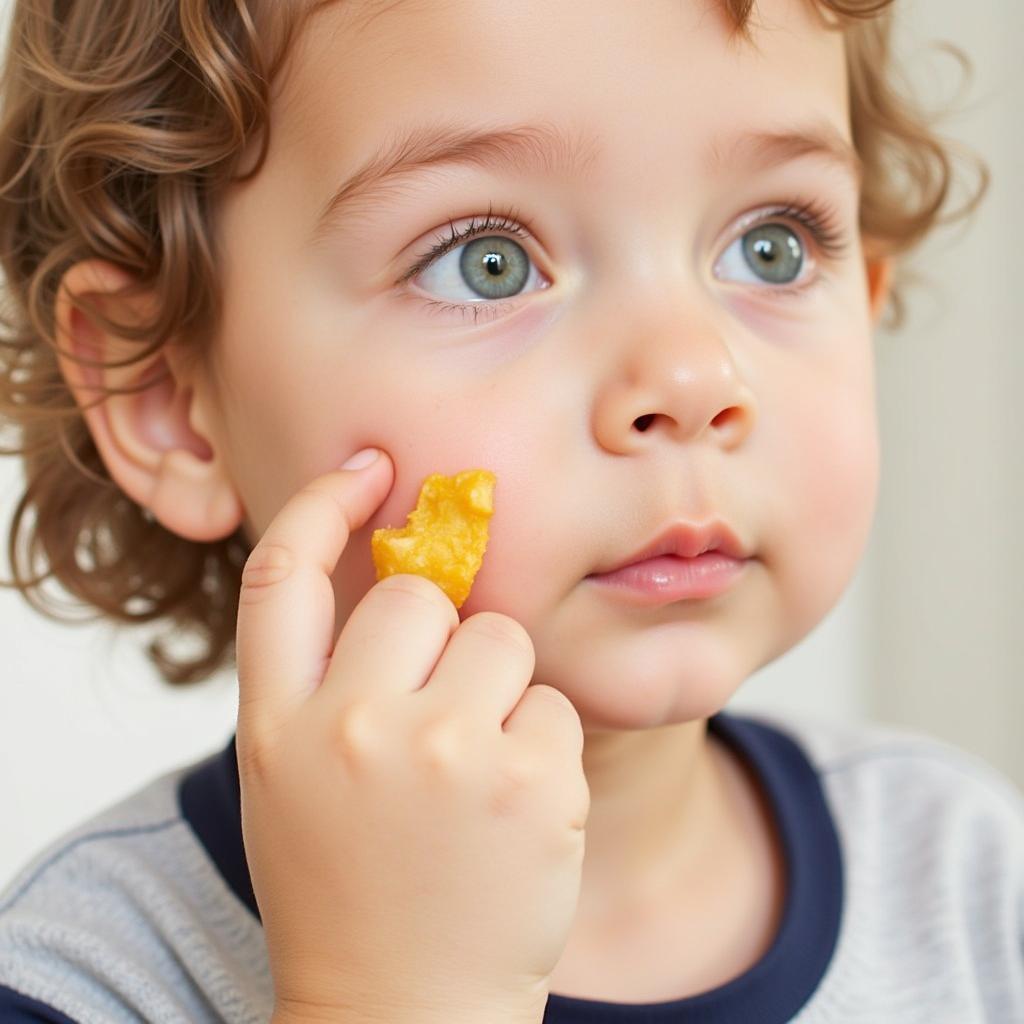Baby Pocketing Food is a common behavior observed in infants and toddlers as they explore the world around them, including mealtimes. It’s characterized by babies storing food in their mouths, specifically in the cheek pouches, instead of swallowing it immediately. While it might seem concerning to parents, it’s often a harmless part of their development.
 Baby with Puree in Cheek
Baby with Puree in Cheek
Why Do Babies Pocket Food?
Several factors can contribute to baby pocketing food:
- Developmental Stage: Babies lack the mature oral motor skills required for efficient chewing and swallowing, leading them to store food in their cheeks until they feel ready to process it further.
- Sensory Exploration: Infants learn about their surroundings through their senses, and food is no exception. Pocketing allows them to experience different tastes and textures at their own pace.
- Satiety Cues: Babies may pocket food as a way of signaling fullness. As their tummies fill up, they might hold onto food in their cheeks rather than continuing to eat.
- Teething Discomfort: Sore gums associated with teething can make chewing and swallowing painful. Babies might resort to pocketing food to avoid discomfort.
 Toddler Holding Finger Food in Cheek
Toddler Holding Finger Food in Cheek
Is Food Pocketing a Cause for Concern?
In most cases, food pocketing is a normal developmental phase that babies and toddlers outgrow. However, it’s essential to be aware of potential concerns and consult a pediatrician if:
- Food Pocketing Persists: If food pocketing continues beyond the typical developmental window or worsens over time, it’s advisable to seek professional guidance.
- Choking Hazards: Ensure the food offered is age-appropriate and cut into small, manageable pieces to minimize choking risks.
- Oral Motor Skills: If you suspect underlying oral motor skill delays, a speech-language pathologist or occupational therapist can assess and provide appropriate interventions.
Tips for Managing Food Pocketing
- Patience is Key: Understand that food pocketing is often a temporary phase and approach mealtimes with patience and encouragement.
- Offer Small Portions: Provide smaller quantities of food at a time to prevent overwhelming your baby’s mouth.
- Encourage Swallowing: Gently rubbing your baby’s cheek or offering sips of water between bites can encourage swallowing.
- Variety is Important: Introduce a variety of flavors and textures to keep mealtimes interesting and stimulating.
When Does Food Pocketing Usually Stop?
Most babies naturally outgrow food pocketing by the time they reach 12-18 months of age. By this stage, their oral motor skills have typically developed sufficiently to allow for more efficient chewing and swallowing.
 Baby Chewing on Soft Food
Baby Chewing on Soft Food
Expert Insights
“Food pocketing is a common developmental phase that parents often observe in their little ones,” says Dr. Emily Carter, a board-certified pediatrician. “It’s crucial to approach mealtimes with patience, offer age-appropriate foods, and consult a healthcare professional if you have any concerns about your child’s feeding development.”
Conclusion
Baby pocketing food, while sometimes messy, is a typical part of a child’s feeding journey. By understanding the reasons behind this behavior, recognizing potential concerns, and implementing helpful strategies, parents can navigate this phase with confidence and support their child’s healthy development. Remember, if you have any concerns about your baby’s feeding habits, don’t hesitate to reach out to your pediatrician or a qualified healthcare professional for personalized guidance and reassurance.
FAQs
1. Is food pocketing harmful to my baby’s teeth?
Food pocketing itself isn’t inherently harmful to teeth, but it’s crucial to establish good oral hygiene habits early on. Gently clean your baby’s gums and teeth after meals to prevent food buildup.
2. Can food pocketing lead to choking?
Offering age-appropriate foods cut into small, manageable pieces can significantly reduce choking risks. Supervise your baby closely during mealtimes.
3. When should I be concerned about food pocketing?
Consult your pediatrician if food pocketing persists beyond 18 months, worsens over time, or if you notice any other feeding difficulties.
4. How can I encourage my baby to swallow the food?
Gently stroking their cheek or offering sips of water between bites can encourage swallowing.
5. What if my baby seems to pocket food more with certain textures?
Experiment with different textures and temperatures to find what your baby prefers.
For further information and support on baby and toddler nutrition, feel free to explore our other articles on the Mina Cones Food website.
Need assistance? Contact us at Phone Number: 02437655121, Email: minacones@gmail.com or visit us at 3PGH+8R9, ĐT70A, thôn Trung, Bắc Từ Liêm, Hà Nội, Việt Nam. Our customer service team is available 24/7.